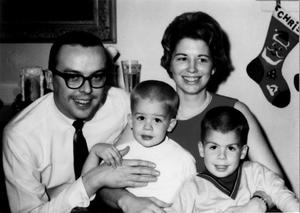
|
|
| photo: Mark Seliger | |
"We all come from families, and all our families have secrets," Michael Hainey says, sitting at the end of a long table in an empty conference room at the offices of GQ, where he works as a deputy editor. "We all have these questions about something that happened in our family, a mystery that maybe we long to go in search of the answer." In his case, the family mystery concerns the sudden death of his father at the age of 35, when Hainey himself was still a young boy. Hainey's memoir, After Visiting Friends, draws its title from the "official" explanation for why his father was found collapsed on a sidewalk in the middle of the night on the other side of home from his Chicago home.
"From the time I was a young boy," Hainey recalls, "the story my family was told, the story my mother told me about the circumstances surrounding my father's death, didn't really add up." But he pushed aside his questions until, coming out of what he describes as a "functioning breakdown" in his mid-30s, he finally resolved to figure out what had happened. It was a quest that would call upon all the skills he'd acquired throughout his journalistic career.
"One of the things working in magazines has taught me is that reporting is the most amazing way to tell a story," Hainey says. He emphasizes that it's an activity we all engage in, every time we have a conversation with someone ("Where are you from? What's going on?") and invokes the classic "five Ws" of journalism: who, what, why, where, when (plus how). "Those are the fundamentals of reporting, and I think they're also the fundamentals of great fiction and nonfiction," he says. "Who's the character, what's their motivation, how are they acting, why are they doing it, where is it happening.... If you, as a writer, drill down on that and always have it in mind, then your story has momentum to it."
 Hainey estimates that he spent five or six years on the initial reporting--interviewing his father's former colleagues, tracking down his medical records, and so on. "I didn't have a book contract or anything, I was just going to write this story for myself," he recalls. "I didn't know what it was going to be, I had no promise it would sell." Though many of the people he spoke to tried to keep him from the truth, he says he bears them no ill will: "I love every person who comes on stage in this book, and I've worked to honor every one who comes in, because I feel that even if someone was stonewalling me, I believe they were doing it out of the best of intentions."
Hainey estimates that he spent five or six years on the initial reporting--interviewing his father's former colleagues, tracking down his medical records, and so on. "I didn't have a book contract or anything, I was just going to write this story for myself," he recalls. "I didn't know what it was going to be, I had no promise it would sell." Though many of the people he spoke to tried to keep him from the truth, he says he bears them no ill will: "I love every person who comes on stage in this book, and I've worked to honor every one who comes in, because I feel that even if someone was stonewalling me, I believe they were doing it out of the best of intentions."
And yet, once he'd pieced together the story, he sat on it for a long time. "A wave of fear had come over me," he admits; he was afraid to tell his mother and his brother what he'd learned, let alone the entire world. Then he got a phone call from one of his sources, a receptionist at the Chicago morgue who'd helped him recover some of his father's paperwork. "You think about the parade of people that come through a morgue every day, having to identify someone who they've lost," Hainey reflects, "and this woman could not have been more full of life and prayerfulness in watching over me." He hadn't spoken to her in over a year and a half, but she called to say that she'd been thinking about him and his story, and it provided the encouragement he needed to move forward.
Hainey also credits his agent, Bill Clegg, for his support during the long process of writing and revision. Although his career has been in magazine journalism, Hainey has also been writing poetry his entire adult life, and Clegg came across some of his work and called, suggesting they meet. "Now, what agent wants to represent a poet?" Hainey asks rhetorically, but it turned out that Clegg believed he saw some further potential in his literary voice. Then, once they'd started working together, Hainey recalls, Clegg told him, "I think you should write a book about your father, because all your poems circle around that."
So Hainey got up at 4:30 every morning and wrote for several hours before going to work; sometimes, he'd spend his lunch break at the New York Public Library, looking over the pages he'd written that morning. When he finally completed the memoir, nearly a decade (and three drafts) after he'd started, he gave the completed manuscript to his mother, and remembers that she called him in tears after she'd read it. "I asked, 'Are you upset?' and she said, 'No, I think this is the most beautiful and powerful thing.... I'm so proud of you. It's a story that needed to be told, and it's the greatest gift you could ever give me.'"
"And here I was, for decades, afraid to confront that story," he marvels. "Because I thought, what would happen to her? And it's brought us closer together." --Ron Hogan, founder of Beatrice.com
Photos courtesy of the Hainey family

